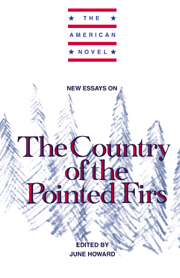Book contents
- Frontmatter
- Contents
- Series Editor's Preface
- 1 Introduction: Sarah Orne Jewett and the Traffic in Words
- 2 Country's Portrayal of Community and the Exclusion of Difference
- 3 Gender and American Realism in The Country of the Pointed Firs
- 4 Material Culture, Empire, and Jewett's Country of the Pointed Firs
- 5 Regionalism and Nationalism in Jewett's Country of the Pointed Firs
- Notes on Contributors
- Selected Bibliography
1 - Introduction: Sarah Orne Jewett and the Traffic in Words
Published online by Cambridge University Press: 08 January 2010
- Frontmatter
- Contents
- Series Editor's Preface
- 1 Introduction: Sarah Orne Jewett and the Traffic in Words
- 2 Country's Portrayal of Community and the Exclusion of Difference
- 3 Gender and American Realism in The Country of the Pointed Firs
- 4 Material Culture, Empire, and Jewett's Country of the Pointed Firs
- 5 Regionalism and Nationalism in Jewett's Country of the Pointed Firs
- Notes on Contributors
- Selected Bibliography
Summary
SARAH Orne Jewett published her first short story when she was eighteen years old, in 1868. The acceptance of “Jenny Garrow's Lovers” by a Boston weekly periodical was quickly followed by others; by the time Jewett turned twenty-one, she had published three more stories and two poems – including a story in the Atlantic Monthly, the leading literary periodical of the day (which paid her the respectable sum of fifty dollars). Although her strongest work was done later, in the 1880s and ′90s, from that first pseudonymous publication until her disabling carriage accident in 1902 not a year passed without something Jewett had written appearing in print. In thirty-five years Jewett published more than two hundred magazine and newspaper pieces, ten collections of short stories and sketches, four books for children, and five novels. And despite the occasional negative notice, her work was consistently praised by critics during her lifetime; it has been admired by at least some readers and scholars ever since. Yet estimates of her importance in American literary history have varied. A certain language of diminution – her work is characterized as “small,” “exquisite,” “minor” – appears from the first in the commentary on Jewett and becomes the keynote of professional literary critics' assessments of her work as the twentieth century passes. Our understanding of Jewett's work has been profoundly revised in recent years, however, and we may again be ready to take seriously Willa Cather's often-quoted assertion: “If I were asked to name three American books which have the possibility of a long, long life, I would say at once, ‘The Scarlet Letter,’ ‘Huckleberry Finn,’ and ‘The Country of the Pointed Firs.’”
- Type
- Chapter
- Information
- New Essays on The Country of the Pointed Firs , pp. 1 - 38Publisher: Cambridge University PressPrint publication year: 1994
- 2
- Cited by

